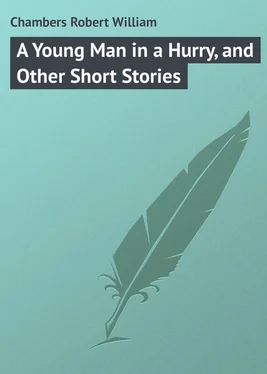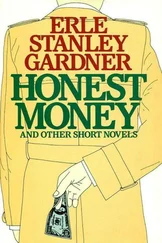Robert Chambers - A Young Man in a Hurry, and Other Short Stories
Здесь есть возможность читать онлайн «Robert Chambers - A Young Man in a Hurry, and Other Short Stories» — ознакомительный отрывок электронной книги совершенно бесплатно, а после прочтения отрывка купить полную версию. В некоторых случаях можно слушать аудио, скачать через торрент в формате fb2 и присутствует краткое содержание. Жанр: foreign_language, foreign_prose, short_story, на английском языке. Описание произведения, (предисловие) а так же отзывы посетителей доступны на портале библиотеки ЛибКат.
- Название:A Young Man in a Hurry, and Other Short Stories
- Автор:
- Жанр:
- Год:неизвестен
- ISBN:нет данных
- Рейтинг книги:3 / 5. Голосов: 1
-
Избранное:Добавить в избранное
- Отзывы:
-
Ваша оценка:
- 60
- 1
- 2
- 3
- 4
- 5
A Young Man in a Hurry, and Other Short Stories: краткое содержание, описание и аннотация
Предлагаем к чтению аннотацию, описание, краткое содержание или предисловие (зависит от того, что написал сам автор книги «A Young Man in a Hurry, and Other Short Stories»). Если вы не нашли необходимую информацию о книге — напишите в комментариях, мы постараемся отыскать её.
A Young Man in a Hurry, and Other Short Stories — читать онлайн ознакомительный отрывок
Ниже представлен текст книги, разбитый по страницам. Система сохранения места последней прочитанной страницы, позволяет с удобством читать онлайн бесплатно книгу «A Young Man in a Hurry, and Other Short Stories», без необходимости каждый раз заново искать на чём Вы остановились. Поставьте закладку, и сможете в любой момент перейти на страницу, на которой закончили чтение.
Интервал:
Закладка:
The victory would have been complete if Sprowl had also been able to purchase the square mile of land lately occupied by O’Hara. But this belonged to O’Hara’s daughter, and the child flatly refused to part with it.
“You’ll have to wait for the little slut to change her mind,” observed Munn to Sprowl. And, as there was nothing else to do, Sprowl and the club waited.
Trouble appeared to be over for the Sagamore Club. Munn disappeared; the daughter was not to be found; the long-coveted land remained tenantless.
Of course, the Sagamore Club encountered the petty difficulties and annoyances to which similar clubs are sooner or later subjected; disputes with neighboring land-owners were gradually adjusted; troubles arising from poachers, dishonest keepers, and night guards had been, and continued to be, settled without harshness or rancor; minks, otters, herons, kingfishers, and other undesirable intruders were kept within limits by the guns of the watchers, although by no means exterminated; and the wealthy club was steadily but unostentatiously making vast additions to its splendid tracts of forest, hill, and river land.
After a decent interval the Sagamore Club made cautious inquiries concerning the property of the late O’Hara, only to learn that the land had been claimed by Munn, and that taxes were paid on it by that individual.
For fifteen years the O’Hara house remained tenantless; anglers from the club fished freely through the mile of river; the name of Munn had been forgotten save by the club’s treasurer, secretary, and president, Peyster Sprowl.
However, the members of the club never forgot that in the centre of their magnificent domain lay a square mile which did not belong to them; and they longed to possess it as better people than they have coveted treasures not laid up on earth.
The relations existing between the members of the Sagamore Club continued harmonious in as far as their social intercourse and the general acquisitive policy of the club was concerned.
There existed, of course, that tacit mutual derision based upon individual sporting methods, individual preferences, obstinate theories concerning the choice of rods, reels, lines, and the killing properties of favorite trout-flies.
Major Brent and Colonel Hyssop continued to nag and sneer at each other all day long, yet they remained as mutually dependent upon each other as David and Jonathan. For thirty years the old gentlemen had angled in company, and gathered inspiration out of the same books, the same surroundings, the same flask.
They were the only guests at the club-house that wet May in 1900, although Peyster Sprowl was expected in June, and young Dr. Lansing had wired that he might arrive any day.
An evening rain-storm was drenching the leaded panes in the smoking-room; Colonel Hyssop drummed accompaniment on the windows and smoked sulkily, looking across the river towards the O’Hara house, just visible through the pelting downpour.
“Irritates me every time I see it,” he said.
“Some day,” observed Major Brent, comfortably, “I’m going to astonish you all.”
“How?” demanded the Colonel, tersely.
The Major examined the end of his cigarette with a cunning smile.
“It isn’t for sale, is it?” asked the Colonel. “Don’t try to be mysterious; it irritates me.”
Major Brent savored his cigarette leisurely.
“Can you keep a secret?” he inquired.
The Colonel intimated profanely that he could.
“Well, then,” said the Major, in calm triumph, “there’s a tax sale on to-morrow at Foxville.”
“Not the O’Hara place?” asked the Colonel, excited.
The Major winked. “I’ll fix it,” he said, with a patronizing squint at his empty glass.
But he did not “fix it” exactly as he intended; the taxes on the O’Hara place were being paid at that very moment.
He found it out next day, when he drove over to Foxville; he also learned that the Rev. Amasa Munn, Prophet of the Shining Band Community, had paid the taxes and was preparing to quit Maine and re-establish his colony of fanatics on the O’Hara land, in the very centre and heart of the wealthiest and most rigidly exclusive country club in America.
That night the frightened Major telegraphed to Munnville, Maine, an offer to buy the O’Hara place at double its real value. The business-like message ended: “Wire reply at my expense.”
The next morning an incoherent reply came by wire, at the Major’s expense, refusing to sell, and quoting several passages of Scripture at Western Union rates per word.
The operator at the station counted the words carefully, and collected eight dollars and fourteen cents from the Major, whose fury deprived him of speech.
Colonel Hyssop awaited his comrade at the club-house, nervously pacing the long veranda, gnawing his cigar. “Hello!” he called out, as Major Brent waddled up. “Have you bought the O’Hara place for us?”
The Major made no attempt to reply; he panted violently at the Colonel, then began to run about, taking little, short, distracted steps.
“Made a mess of it?” inquired the Colonel, with a badly concealed sneer.
He eyed the Major in deepening displeasure. “If you get any redder in the face you’ll blow up,” he said, coldly; “and I don’t propose to have you spatter me.”
“He – he’s an impudent swindler!” hissed the Major, convulsively.
The Colonel sniffed: “I expected it. What of it? After all, there’s nobody on the farm to annoy us, is there?”
“Wait!” groaned the Major – “wait!” and he toddled into the hall and fell on a chair, beating space with his pudgy hands.
When the Colonel at length learned the nature of the threatened calamity, he utterly refused to credit it.
“Rubbish!” he said, calmly – “rubbish! my dear fellow; this man Munn is holding out for more money, d’ye see? Rubbish! rubbish! It’s blackmail, d’ye see?”
“Do you think so?” faltered the Major, hopefully. “It isn’t possible that they mean to come, is it? Fancy all those fanatics shouting about under our windows – ”
“Rubbish!” said the Colonel, calmly. “I’ll write to the fellow myself.”
All through that rainy month of May the two old cronies had the club-house to themselves; they slopped about together, fishing cheek by jowl as they had fished for thirty years; at night they sat late over their toddy, and disputed and bickered and wagged their fingers at each other, and went to bed with the perfect gravity of gentlemen who could hold their own with any toddy ever brewed.
No reply came to the Colonel, but that did not discourage him.
“They are playing a waiting game,” he said, sagely. “This man Munn has bought the land from O’Hara’s daughter for a song, and he means to bleed us. I’ll write to Sprowl; he’ll fix things.”
Early in June Dr. Lansing and his young kinsman, De Witt Coursay, arrived at the club-house. They, also, were of the opinion that Munn’s object was to squeeze the club by threats.
The second week in June, Peyster Sprowl, Master of Fox-hounds, Shadowbrook, appeared with his wife, the celebrated beauty, Agatha Sprowl, née Van Guilder.
Sprowl, now immensely large and fat, had few cares in life beyond an anxious apprehension concerning the durability of his own digestion. However, he was still able to make a midnight mouthful of a Welsh rarebit on a hot mince-pie, and wash it down with a quart of champagne, and so the world went very well with him, even if it wabbled a trifle for his handsome wife.
“She’s lovely enough,” said Colonel Hyssop, gallantly, “to set every star in heaven wabbling.” To which the bull-necked Major assented with an ever-hopeless attempt to bend at the waistband.
Читать дальшеИнтервал:
Закладка:
Похожие книги на «A Young Man in a Hurry, and Other Short Stories»
Представляем Вашему вниманию похожие книги на «A Young Man in a Hurry, and Other Short Stories» списком для выбора. Мы отобрали схожую по названию и смыслу литературу в надежде предоставить читателям больше вариантов отыскать новые, интересные, ещё непрочитанные произведения.
Обсуждение, отзывы о книге «A Young Man in a Hurry, and Other Short Stories» и просто собственные мнения читателей. Оставьте ваши комментарии, напишите, что Вы думаете о произведении, его смысле или главных героях. Укажите что конкретно понравилось, а что нет, и почему Вы так считаете.











